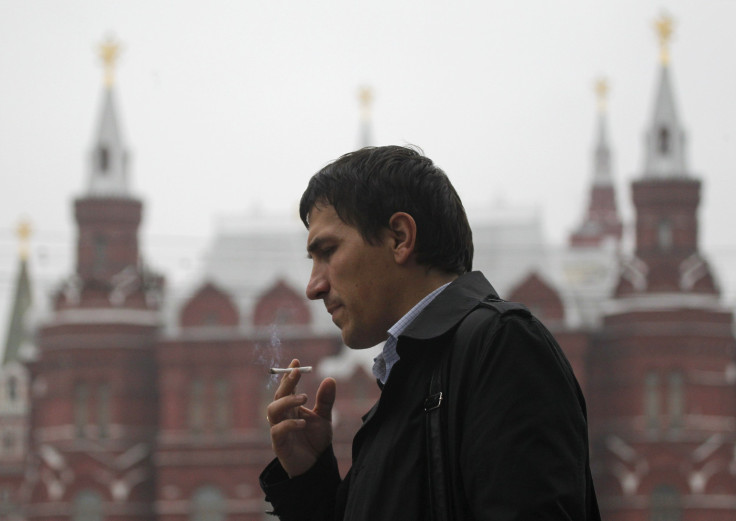In Russia, Public Smoking Ban Is In For A Tough Fight

Russian Prime Minister Dmitry Medvedev announced that the government will begin considering a new bill to help the country cut back on its heavy smoking habit. It would include a ban on smoking in public areas by 2015, a clampdown on tobacco advertising and new excise taxes to raise the price of an average pack.
Medvedev, who does not smoke, alerted viewers to the potential benefits of the legislation in a video-blogged address.
“Higher excises on cigarettes will give a possibility to get additional money for the budget of health care, as well as for aid programs for those who want to give up smoking and for social advertising of a healthy lifestyle,” he said, according to Russian news agency Itar-Tass.
But can those economic benefits stand up to a national nicotine addiction? Quitting smoking, they say, may result in mood swings. So we can expect Russians to get a whole lot pricklier in the coming months.
The real challenge is a cultural one. In Russia, cigarettes have been easy to get and widely tolerated for decades -- by now, they’re a fixture.
The average price per pack is less than US$2. Smoking is allowed both outdoors and inside -- even in children’s environments, public transport and health care facilities. What few restrictions do exist are poorly enforced. For instance, the legal cigarette purchasing age is 18, but minors often buy packs and smoke cigarettes in public.
As a result, Russia is the second-largest tobacco market on Earth, after China. Medvedev said that 44 million citizens are hooked on smoking, and his estimation is in line with statistics from the World Health Organization. About 40 percent of Russians smoke, and one-third of the entire population lights up on a daily basis.
That gives Russia one of the world’s highest rates of smokers per capita.
Of those 44 million smokers, added Medvedev, about 400,000 die from the habit each year. It’s a serious problem in a country where births have not kept pace with deaths for the last decade and population growth currently stands at zero, according to World Bank estimates.
A problem of this size must be tackled incrementally, and Medvedev understands this. According to the proposed legislation, he said, “restaurants, cafes, bars will be imposing [the ban] stage by stage, as this has been done in other countries of the world.”
The prime minister will need all the help he can get, as Russia has long been a very smoky place. Peter the Great smoked. Stalin smoked. Even tennis superstar Anna Kournikova has been caught lighting up.
Russia’s most famous author, Leo Tolstoy, was also a smoker -- at least until just before the turn of the 20th century. He gave up the habit in his golden years, around the same time he rejected material wealth and the consumption of meat.
By some accounts, this drastic lifestyle change didn’t go well for him. He lost influential friends and had a falling-out with his young wife. He stopped composing the masterful, sweeping works of fiction that made him famous -- like “War and Peace” or “Anna Karenina” -- to focus on dry moral treatises and philosophical essays.
Then again, this prolific writer survived until the ripe old age of 82.
Today, Russia’s average life expectancy is about 66 -- a deplorable figure for a major world power and something the Kremlin would like to change.
Maybe Tolstoy -- and Medvedev -- are onto something.
© Copyright IBTimes 2024. All rights reserved.






















